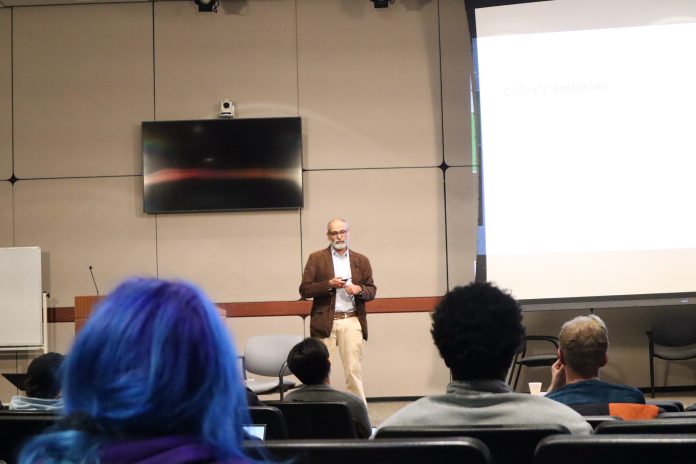
On Wednesday, April 9, DePauw faculty and students welcomed Dr. Vikash Yadav to the Watson Forum, where he delivered a talk on “Freedom in an Algorithmic Society: Technology, Development and Political Capitalism in Asia.” In his talk, Dr. Yadav explored how technology, particularly artificial intelligence, is reshaping economies and societies in China, while raising urgent questions about freedom, labor, and state control in the digital age.
In the morning, a group of students joined Dr. Yadav for brunch in Darnall Hall, where they had a thoughtful conversation about India, China and the global race for dominance in artificial intelligence. Answering questions about how India compares to China in terms of technology growth and state control, he shared his views on how both countries are shaping their futures with AI in very different political and social contexts. China’s authoritarian government enables it to implement large-scale AI initiatives with strict oversight and surveillance, often prioritizing state control over individual freedoms. In contrast, India’s democratic structure, with its pluralistic society and decentralized governance, allows for more fragmented but open-ended technological development, often influenced by private enterprise, civil society, and a relatively free press. Dr. Yadav also reflected on how much DePauw has changed since his time as a student, from the campus culture to the buildings themselves—some familiar, others completely new. It was a thoughtful dialogue between current DePauw students—first-years, sophomores, juniors and seniors—and a DePauw alum.
Later in the day, Dr. Yadav presented his talk at Watson Forum, drawing an engaged audience of students, professors and staff. He spoke about how China is shifting from a factory-based economy to one focused on technology and services, which he related to the term “birdcage economy” - how the Chinese government controls which companies to support and which ones to push aside. As China moves forward, old factories are being shut down or moved to other countries, while new, high-tech firms are being promoted. This change has created many problems for workers, especially those who now take up unstable gig jobs like food delivery, often working under a lot of pressure and without security.
Much of Dr. Yadav’s talk was about how technology is being used to control people’s behavior. Apps and platforms use points, games and tracking to push workers to do more in less time. He described how this leads to emotional stress and even despair. Using a powerful example of a delivery driver in China who broke down after being stopped by police, he showed how difficult life is for many in this system.
He ended by comparing China to the U.S., saying that even though both use technology, the U.S. still has some protections for individual freedom, while China’s system is more tightly controlled by the state. Moreover, Dr. Yadav explored what this means for the future. He said that while China is pushing hard to modernize and move past being a low-income country, it doesn’t always have a clear plan for what happens to the workers left behind. Many of them are not legal residents of the cities they live in, and they don’t have access to the same rights or support. Even people with good tech jobs are starting to feel the pressure—especially if they don’t come from wealthy families. As the government focuses on reaching big goals like becoming a global superpower by 2049, it risks ignoring the everyday struggles of its people.
Dr. Yadav’s visit to DePauw gave students a chance to learn from his experience and insights on technology, development and political changes in Asia. His experience as both an alum and a scholar enriched the conversation, giving students a unique perspective on global issues like AI, China’s economic shift and the challenges faced by workers in this new landscape. His talk provided a thought-provoking exploration of China’s future and the delicate balance between modernization and the well-being of its people.
